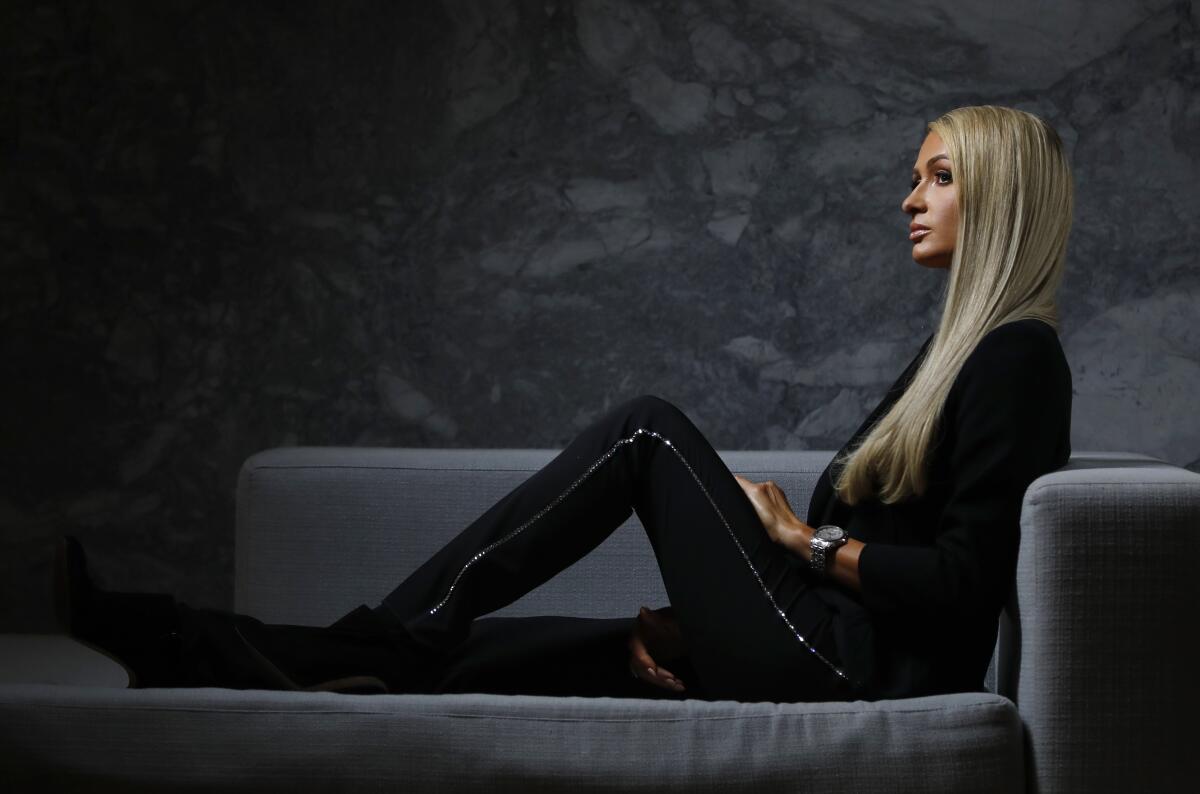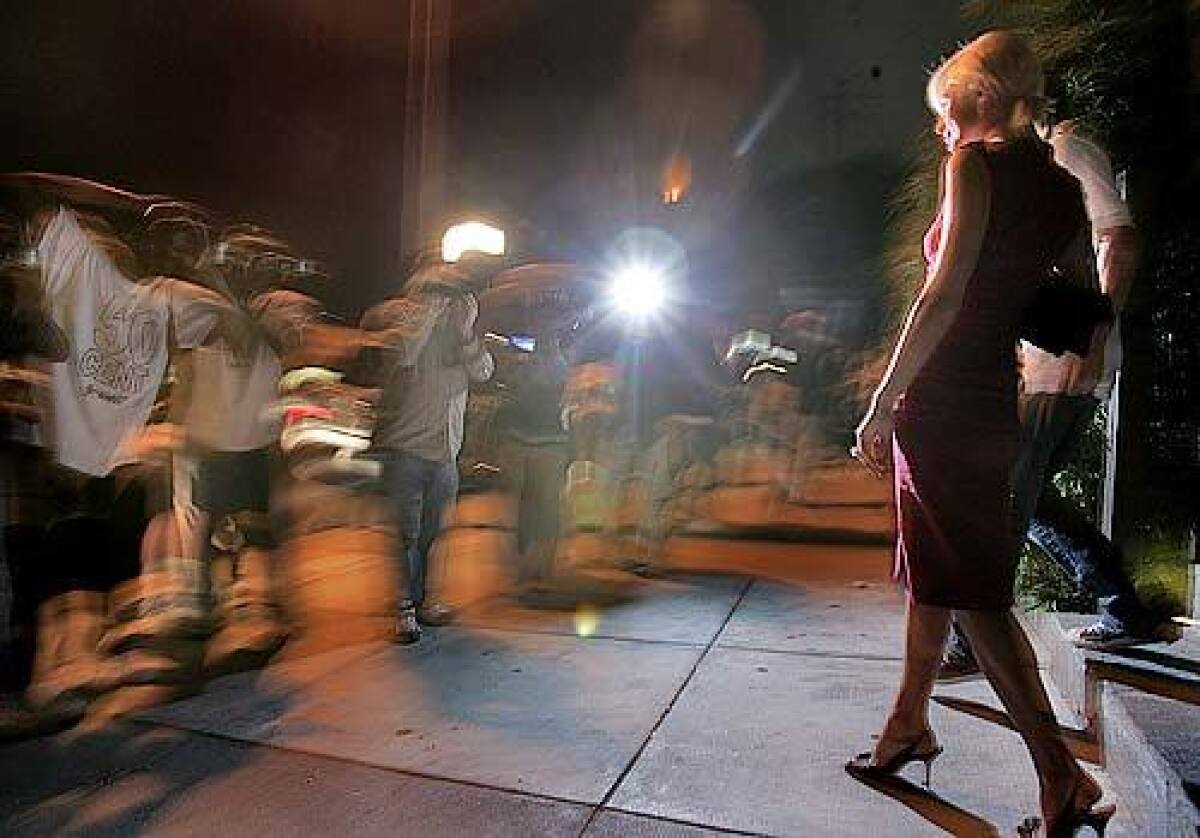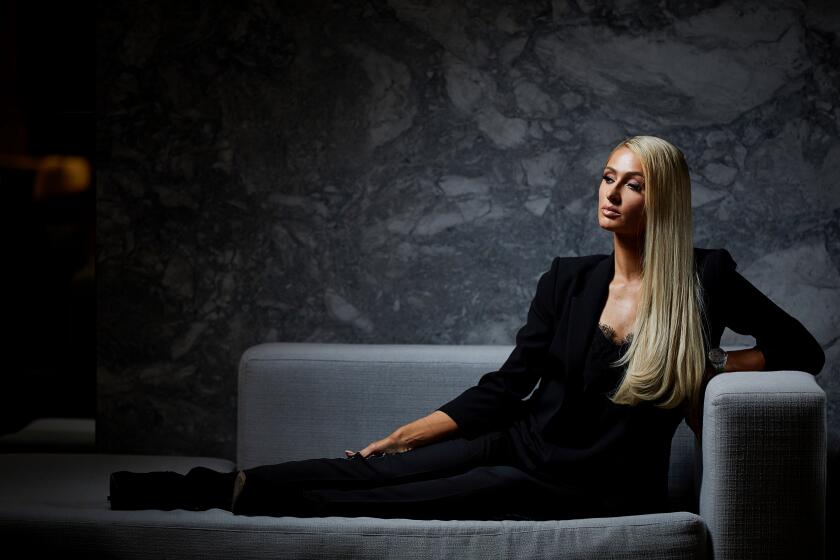Surviving abuse bonded Paris Hilton and these four women for life

- Share via
In a few days, Raina Lincicum is due to give birth to her sixth child. She and her family live in Bellingham, Wash., a city where the median household income is $50,844. Her husband owns an electronics repair business, and she’s been working on getting her own degree from a local technical college in between raising their kids.
Her life bears little outward resemblance to Paris Hilton’s. But at 39, the hotel heiress has come to count Lincicum as one of her few confidants.
Twenty years ago, the two women met as roommates at the Provo Canyon School, a residential treatment center for supposedly troubled youths. Lincicum, who had fled an abusive household, was living on the streets of California and sent to the program through the state legal system. Hilton’s parents decided to ship their daughter off to Utah because they thought she was spending too much time at nightclubs.
Paris Hilton, businesswoman, DJ, influencer and former reality TV star, used to be tabloid fodder. After leaving the public spotlight, she’s now ready to tell her story.
But even though the teenagers had shared a barren room — their few belongings stored in trash bags — they never discussed the way they were treated at PCS until last year. That’s when, in the midst of filming a documentary about her life, Hilton decided to reveal that she had been physically and verbally abused at the high school. She reconnected with Lincicum and three other students from the institution, inviting them to her home in Beverly Hills to reunite on camera and share their stories for the first time.
“I can relate to them more than people in this town,” Hilton said of her former classmates. “I love that they’re actually normal, genuine, real people. They don’t want to be famous. They are traumatized like me and have hidden the story and not talked about it. Coming together is almost therapeutic. I won’t see a therapist, but I feel like talking to them is like having a million therapy sessions, because they understand me completely.”
“This Is Paris,” which was released Monday on YouTube, was not initially intended to center on Hilton’s adolescent trauma. Filmmaker Alexandra Dean had pitched it to Hilton as a way to show fans a more unvarnished side of herself, theorizing that she’d been misjudged as solely the airhead blond on “The Simple Life” or the socialite with a sex tape. The director had been trailing Hilton for seven months when, during a press stop in Korea, she noticed her subject seemed particularly emotionally fragile. Hilton hadn’t slept in two days and confessed that she’d been having nightmares.
“She’d spent the day taking selfies with people for three hours without a bathroom break in some little lacy dress somebody had literally sewn her into as if she was a living Barbie,” recalled Dean. “She would never be angry with anybody. She never snapped. Always smiling. So I thought: ‘Oh my God, at what point does she crack?’ By the time we got back to the hotel room, I was like, ‘What is going on here?’ Because she was so exhausted and had clearly pushed the character to the edge, the cracks were showing and it wasn’t hard to see that she was desperate to talk to somebody about it.”
Reality star Paris Hilton says, “It’s, like, hard for me to be normal” in a new trailer for a YouTube documentary about her life, “This Is Paris.”
Hilton divulged that at 17, she had been awoken in the dead of night by PCS representatives and hauled from her bed as her parents looked on crying. During her 11 months at the school — one of five she attended as a teen — she said she was prescribed unknown pills that made her “tired and numb,” beaten by staff members and thrown into a cold solitary confinement chamber for nearly 20 hours. She was unable to relay the alleged mistreatment to her parents because her phone calls were monitored, and when she finally graduated, she made a vow to herself to bury the traumatic memories.
But in her dreams, disturbing recollections still haunted her.
“Every single night, literally, 99% of my nightmares were about being taken from my room and being locked up in these places and trying to escape,” Hilton said. “It just felt so real, to the point where I would wake up in the middle of night, in hysterics crying, in hot sweats, not being able to breathe and having panic attacks. When I started opening up about it, I realized: ‘That’s why you invented this character. That’s why you put up the mask.’ It was all a way to build this happy fantasy life so I wouldn’t have to think about what had been done to me.”
PCS did not respond to The Times’ request for comment. But on its website, the school posted a statement saying that because it was sold by previous ownership in 2000, “we therefore cannot comment on the operations or patient experience prior to that time. We are committed to providing high-quality care to youth with special, and often complex, emotional, behavioral and psychiatric needs.”
In an effort to corroborate Hilton’s account, Dean set out to find other students who had known her during her time at PCS. The director first connected with Katherine McNamara, a 38-year-old cybersecurity solutions architect for Cisco who also moderated a Facebook support group for program survivors. McNamara, who lived in nearby Pasadena, tracked down Lincicum, 38, and two more women — Elizabeth Abeysekera, 38, and Jessica Pike, 39 — who had also been Hilton’s peers.
Lincicum, her onetime roommate, found the prospect of appearing in a film “scary” but ultimately decided it was a “a no-brainer because of course we have to see each other and talk about this. It’s so big.”
Abeysekera, a mother of five who lives in the Chicago suburbs, had more trepidation.
“When I was initially talked to about doing an interview, I was kind of like, ‘Eh, maybe,’ because I had spent 21 years actively avoiding it,” said Abeysekera, speaking on a five-way video call with her former classmates. “I was at a nice balance point. I didn’t want to mess with that. But eventually, thinking it through, I was like: If I don’t say something or take some action, then I’m complicit. I didn’t want to feel like that.”
Pike, who runs a Colorado cleaning business clearing out foreclosed homes — “we’ve found dog heads in boxes” — was so hesitant about participating that she had Hilton send a selfie with Dean as proof of her involvement in the project.
“The whole situation was crazy and felt kind of unbelievable,” said Pike, who was video chatting from the passenger seat of a pull-behind trailer. “I hadn’t thought about it at all until the documentary came up, and I had a hard time a little bit after filming because then it brought all kinds of stuff up to the surface.”
At Hilton’s home in August 2019, the women spent 12 hours bonding over their PCS experiences. Lincicum recounted how, upon arrival, she’d been made to squat and cough “like a criminal hiding drugs in your vag.” Because of prior sexual trauma, she refused, and said that employees then held her down and stripped her. McNamara recalled being assigned a therapist who had no certification and pushed religious beliefs on her. Hilton said she saw people get in trouble for merely uttering Marilyn Manson’s name.
“To be able to talk about it and not feel alone anymore felt amazing,” Hilton said. “I’d been a little worried that it would be weird — like, ‘oh my God, what are they going to think of me?’ But I also felt proud. Like who would have imagined that girl there could have built this life?”
Over the course of the visit, the women told Hilton they’d never bought the ditzy image Hilton had sold to the public for decades. At one point, overcome by emotion, she retreated to her closet as Dean followed with a camera.
“Hanging out with people who just treated her like a normal person and remembered her from, like, math class — it shook her,” Dean said. “They were treating her like Paris before all of this, and suddenly she could see what her life could have been.”
Asked how they remembered Hilton from PCS, Lincicum described her as “a freakin’ brilliant woman” who had a target on her back because of her parents’ wealth.
“She was freakishly smart. It’s scary,” added Abeysekera. “I saw Paris as an incredibly genuine, authentic person. So seeing her do this and use her platform to speak up for everybody who doesn’t have a voice is not the least bit out of character.”
“This Is Paris” is not entirely about PCS, though Hilton’s revelations about her time there do color other scenes in the film. Her sister, Nicky, urges her to abandon her years-long quest to make a billion dollars in favor of settling down and starting a family. She shows off a stack of defunct laptops, noting that she gets a new computer every time she has a new boyfriend because of her trust issues. And before her first DJ set at the Tomorrowland electronic dance music festival, she kicks out an attention-seeking man she’s dating after he becomes belligerently drunk and picks a fight with her. Hilton begged Dean to scrap the Tomorrowland footage, but she did not have final cut approval on the documentary.
“She’s very real in that moment. And I think being very real is very scary for Paris Hilton,” said the director. “I got these therapy-like moments of her opening up and giving glimpses of who she really is today on camera. And I didn’t actually expect that. I didn’t know if she was capable of that, and she very much is. But I think to expect that this film will completely lift the mask and show the Paris Hilton that even Paris Hilton doesn’t know anymore isn’t realistic.”

Hilton said she still feels like the film is quite personal, and was so anxious about showing it to her parents before release that she told them she hadn’t received a screener. That wasn’t true. She was stalling, she said, because she was worried about how they would react to hearing her talk about her time at PCS.
“I want to watch it with them, because I know if I’m not there they’re just going to be so upset,” she said. “I can’t imagine if I sent my child to what I thought was a normal school and learned they were abused — you feel like you could never forgive yourself. I don’t blame them, because I know they were manipulated by these people. But it’s going to be very hard to watch it together.”
Because of the statute of limitations, Hilton and the four other PCS students in the film cannot take legal action against the school. But for the first time in 20 years, she said, her nightmares have receded. She’s hoping to pursue a follow-up series focusing specifically on disciplinary schools, and said she is in touch with state Sen. Sara Gelser of Oregon about teaming up on regulatory legislation.
As for her newly rediscovered PCS friends, she keeps in touch with them via a WhatsApp group chat — though she’s had to restart it a few times after her phone got hacked.
“Welcome to the world of Paris. So annoying,” Hilton told the other women, advising them of her new number.
“You’re so patient, because I would have lost it,” said Abeysekera. “It sounds like a sick invasion of privacy.”
“It sounds super annoying — like, more than annoying, honestly. Maddening,” added Lincicum. “I can’t wait until people see you for real. I can’t freaking wait.”
More to Read
Only good movies
Get the Indie Focus newsletter, Mark Olsen's weekly guide to the world of cinema.
You may occasionally receive promotional content from the Los Angeles Times.












